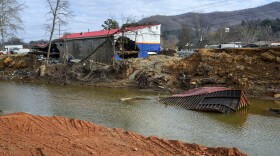Asheville restaurant owner Eric Scheffer describes himself as an optimist.
But even he has a hard time staying positive when taking stock of the challenges facing Asheville’s independent restaurant scene — which he helped establish more than 20 years ago.
“I know that at some point this too shall pass and Asheville will start to come back,” he said during a recent interview. “But it's more difficult than ever for me these days to not walk out of a meeting with my staff or even with city officials with tears in my eyes.”
Scheffer is one of many Asheville restaurant owners struggling to figure out the way forward after Hurricane Helene devastated much of the region and toppled its tourism-dependent economy.
It’s been a little over two weeks since drinkable tap water returned to Asheville. Residents were overjoyed. But for local restaurant owners and workers, the recovery effort has only just begun — and the future is uncertain.
The Buncombe County Tourism Development Authority estimates that local restaurants and other businesses may see revenue losses of up to 70% in the final quarter of the year.
“That means about $585 million for our local economy,” TDA President and CEO Vic Isley said at a recent meeting.
‘There’s just no other option’
In Asheville after Helene, it feels like every week another restaurant announces that a temporary closure has turned into a permanent one.
Among those that have reopened, owners have been doing their best to survive, even when it’s meant taking unconventional steps.
During the weeks without water, some pared down their staff, their menus and their hours. Others had giant water tanks installed through an effort spearheaded by Scheffer. A total of 20 local eateries used the tanks, including Scheffer’s own Jettie Rae’s Oyster House, Gan Shan West and Vinnie’s Neighborhood Italian.
The tanks allowed some restaurants to keep their doors open but at a steep cost of about $1,000 a day.
Katie Button, one of the city’s most prominent chefs, said that in addition to having to rent a water tank, her revenue is down about 50% from its usual level.
In the wake of the storm, she’s had to lay off 45 people, or about 30% of her staff.
“That is really tough because we're in a situation where there's just no other option,” Button told BPR. “And they're in a situation where there aren't a ton of jobs.”

One of Button’s eateries, the Spanish tapas restaurant Cúrate, has partially reopened, while the other, La Bodega, remains shut for now, given the limited number of tourists and locals downtown.
Even businesses that survived the worst of the storm have been struggling, she said.
“I mean, I'm gonna be honest. I think we have yet to see the impact of the storm on businesses. A lot of them are hanging on, hoping insurance comes through, hoping that the holidays are better than they're expecting, trying to get the most out of these couple of months," Button said.
"But the truth is, the economic contraction in our area will be devastating to many, many, many small businesses. And I think over the next six months to a year, we'll see that impact," she added.
While there is some financial assistance available, much of it is in the form of loans that will have to be repaid.
Many restaurant owners who took on significant debt during the coronavirus pandemic are hesitant to take out even more loans just a few years later. And then there’s the reality that even with safe running water, it could take years for tourism to return to its pre-storm levels.
From state’s lowest unemployment to highest
Some in the industry worry that the setbacks could prompt an exodus of service workers or exacerbate existing inequalities in the city.
Among them is Brian Dunsmore, a steering committee member for Asheville Food and Beverage United, a volunteer-run union for service industry workers.
“We had so many folks who are on a razor's edge of staying in town, period, because of high rent costs, because of low wages,” Dunsmore said. “And, you know, when you're on a razor’s edge, anything — like, a medical debt — would be enough, much less a gigantic hurricane that closes down the town for two months, basically. So yeah, we’ve lost so many people.”

In October, Buncombe County’s unemployment rate skyrocketed to 8.8%, the highest in the state, according to the North Carolina Department of Commerce. One month earlier, before the storm, the rate was 2.5%, among the state’s lowest.
The union has sent a petition to local government leaders calling for an eviction moratorium, increased rental assistance and legislation to allow tourism tax dollars to be used to provide greater support to small businesses and workers.
Dunsmore urged residents to not only support local businesses but also to join in calling on state and local elected officials to do more to help. City Council members have expressed support for a local pause on evictions but lack the legal authority to institute a moratorium.
For some in Asheville, life has slowly “gotten back to normal,” Dunsmore said. But for most service workers “they have very much not — and will not, frankly, probably for quite some time; well past the holidays — for most of our folks. There's just an incredible amount of precarity there.”









